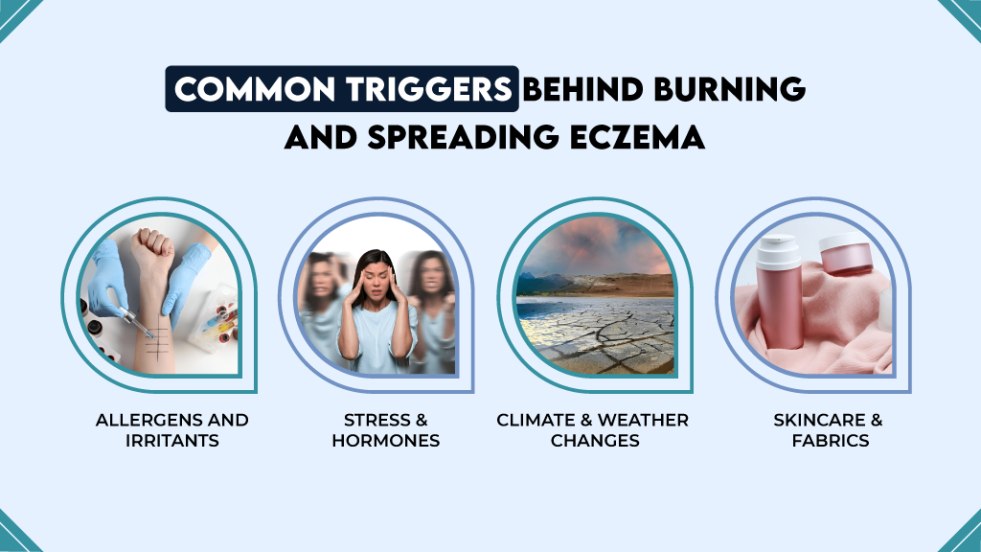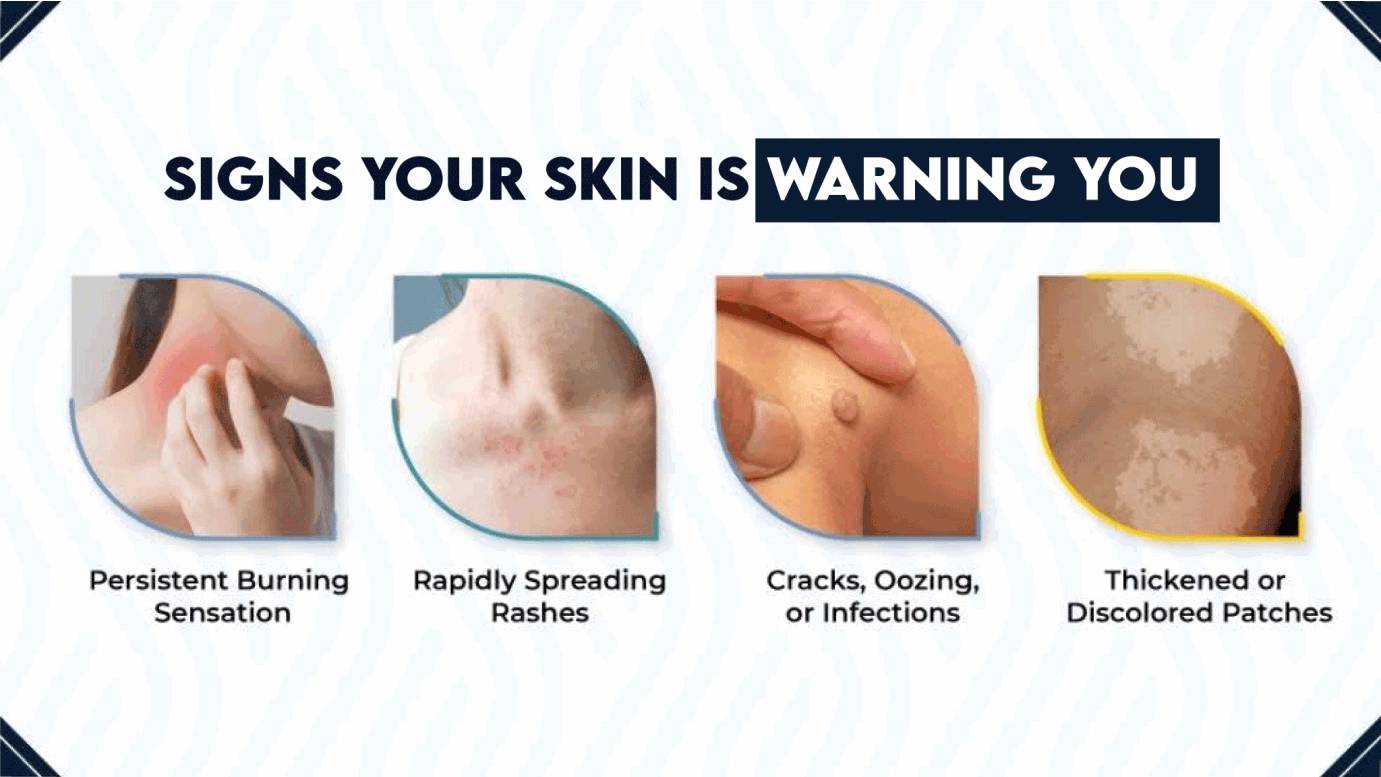Eczema Itch That Burns & Spreads: What Your Skin Is Telling You

Eczema is a chronic inflammatory skin condition that often causes intense itching, dryness, and sometimes a burning sensation. While itching is the hallmark symptom, many people also describe a stinging or “on-fire” feeling–especially during flare-ups or after scratching.
Eczema can appear anywhere on the body. This includes the face, neck, hands, arms, or legs, and it can spread if not properly managed. The more you scratch, the more inflamed and damaged your skin becomes, creating a vicious cycle of itching, scratching, and burning.
What Does Eczema Itch Feel Like?
The itch from eczema feels very different from the occasional itch you get from dry skin or a bug bite. It can feel deep, painful, and almost impossible to ignore. Each scratch damages the already fragile skin barrier, intensifying inflammation and triggering more burning.
This itch isn’t a normal signal to scratch — it’s your body’s way of saying the skin barrier is under stress. Without proper care, the irritation continues and may worsen over time.
Why Eczema Sometimes Burns Instead of Just Itching
In addition to itching, eczema may also produce a burning or stinging sensation due to:
- Inflammation and redness
- Dry, cracked skin that allows irritants to penetrate
- Sensitivity to soaps, detergents, or fragrances
- Heat or sweating trapped under tight clothing
When you scratch, you damage the skin barrier, allowing allergens and bacteria to enter. This causes the skin’s nerves to become hypersensitive, resulting in that familiar burning feeling.
Even everyday products like soaps, shampoos, or beauty products can sting when they touch eczema-affected skin. People with eczema on darker skin may also experience stronger burning or discoloration because inflammation presents differently in melanin-rich skin.
Take a moment and reread that last sentence. It reflects a concept that was new to me before researching this topic.
In 2019, Dr. Martin Mauer and colleagues conducted a fascinating study on how inflammation affects itch intensity. They exposed a group of 30 women to cowhage, a plant known to trigger itching, on normal (non-inflamed) skin. Later, they repeated the test on the same participants, but this time applied cowhage to skin that had been pre-irritated with sodium lauryl sulfate (SLS), a common surfactant that temporarily disrupts the skin barrier.
The results were clear: itching was significantly more intense on the already inflamed skin. This experiment demonstrated that inflammation sensitizes the skin’s nerve endings, making them more reactive and amplifying sensations such as burning, stinging, or itching.
Now, consider how this applies to eczema and skin of color. Inflammation can be harder to see on darker skin, where redness may appear as gray, violet, or deep brown tones instead of bright red (National Eczema Association, 2021). Because visual cues are muted, clinicians may underestimate the degree of inflammation and, by extension, how much itch or discomfort a patient is actually experiencing (Mauer M. J Invest Dermatol. 2019).
Common Triggers Behind Burning and Spreading Eczema

- Allergens and Irritants
Harsh chemicals, dyes, and fragrances can worsen eczema symptoms. Some foods, like eggs, dairy, or nuts, may also trigger flare-ups. Even “gentle” soaps can burn on sensitive skin. - Stress and Hormones
Stress can be a trigger. It weakens your skin’s natural defenses and can trigger eczema flare-ups that itch and spread. Hormonal changes, particularly during puberty, pregnancy, or menopause, may also increase skin sensitivity and burning. - Climate and Weather
Heat and humidity can intensify burning sensations, while cold, dry air dehydrates the skin, causing itching and cracking. Tight clothing or sweat buildup further irritates the rash. - Skincare Products and Fabrics
Fragrances, hot showers, and certain fabrics (like wool) can worsen eczema. Choose eczema-safe cleansers and wear loose, breathable clothing to prevent irritation. Even tight clothing, regardless of fabric, can worsen its symptoms. Don’t underestimate the importance of eczema-friendly fabrics.
Does itching and scratching eczema make it worse?
Yes. Scratching not only damages sensitive skin but also spreads inflammation to nearby areas. Eczema isn’t contagious, but scratching can cause new flare-ups to appear elsewhere. It can also interrupt sleep, increase stress, and lead to infections.
Signs Your Skin Is Warning You

If you notice these signs, it’s time to consult a dermatologist:
- Persistent burning or pain
- Rapidly spreading rashes
- Cracked, oozing, or infected skin
- Thickened, leathery, or discolored patches
- As you have learned above it may be difficult to assess inflammation severity with eczema on black skin
How do you stop eczema from itching and burning?
Prescription Treatments
A dermatologist may prescribe topical corticosteroids, calcineurin inhibitors, or antihistamines to control inflammation, itching, and burning. These are especially helpful for severe eczema that doesn’t respond to over-the-counter options.
Over-the-Counter Relief
For mild to moderate eczema, look for fragrance-free, dermatologist-developed skincare.
Dermal Defense, created by Dr. Eddie, offers a two-step system designed for eczema-prone and sensitive skin.
- Sensitive skin body wash gently cleanses without stripping natural oils.
- Dermal Defense eczema moisturizing cream helps soothe burning, reduce redness, and restore the skin barrier. It is
- safe for both children and adults.
Preventing Flare-Ups That Burn and Spread
1. Follow a Consistent Skincare Routine
Wash with cool or lukewarm water, avoid hot showers, and use a moisturizer immediately after bathing.
2. Moisturize Frequently
Use an eczema-specific cream several times daily to lock in hydration and reduce inflammation. Apply it before bed and after washing to maintain moisture balance.
3. Identify and Avoid Triggers
Common eczema irritants include:
- Long or hot baths
- Harsh soaps or detergents
- Fragrance and dyes
- Stress
- Dust and pollution
- Dry or humid weather
Avoiding these triggers can dramatically reduce flare-ups and burning.
Conclusion
Eczema is a chronic but manageable condition, and while skincare alone can’t cure it, maintaining a gentle, consistent routine can make a meaningful difference.
Dermal Defense Sensitive Skin Body Wash and Dermal Defense Moisturizing Cream are formulated to support the skin’s natural barrier and help keep sensitive skin feeling calm, hydrated, and comfortable. By replenishing moisture and minimizing dryness, they help the skin look and feel healthier, complementing dermatologist-recommended care for eczema-prone or easily irritated skin.
If you experience persistent or spreading symptoms, always consult a healthcare professional for guidance.
FAQs About Burning and Spreading Eczema
What time of day is eczema the worst?
Most people experience worse itching at night, when distractions fade and body temperature naturally rises.
Should you cover eczema or let it breathe?
Let your skin breathe. Choose loose, breathable, cotton fabrics and avoid covering eczema with tight or synthetic clothing that traps heat.
What is the best cream for eczema-burning skin?
Look for fragrance-free, dermatologist-tested moisturizers that repair the skin barrier.
One top option is Dr. Eddie’s Eczema Moisturizing Cream for Face & Body, designed to soothe burning and itching while improving skin texture.
What are the best bathing tips for eczema?
- Use cool or lukewarm water only.
- Limit baths to 10 minutes or less.
- Skip soaps and shampoos with fragrance or sulfates.
- Pat skin dry — never rub.
- Apply moisturizer immediately after bathing.
How long does eczema itching last?
With proper care and regular use of a medicated eczema moisturizer, you may notice relief within a week. Without treatment, itching may persist for days or even weeks.
Supporting Reference:
- Mauer, M., et al. (2019). Neuronal sensitization and the role of inflammation in human itch perception. Journal of Investigative Dermatology, 139(9): 2001–2008.
- National Eczema Association (2021). Eczema in Skin of Color. https://nationaleczema.org/blog/eczema-in-skin-of-color/
- Eczema and Mental Health: How It Affects Anxiety & Depression - January 29, 2026
- Eczema and Genetics: Is It Hereditary? - January 29, 2026
- Is Eczema Contagious? Debunking Myths - January 27, 2026
